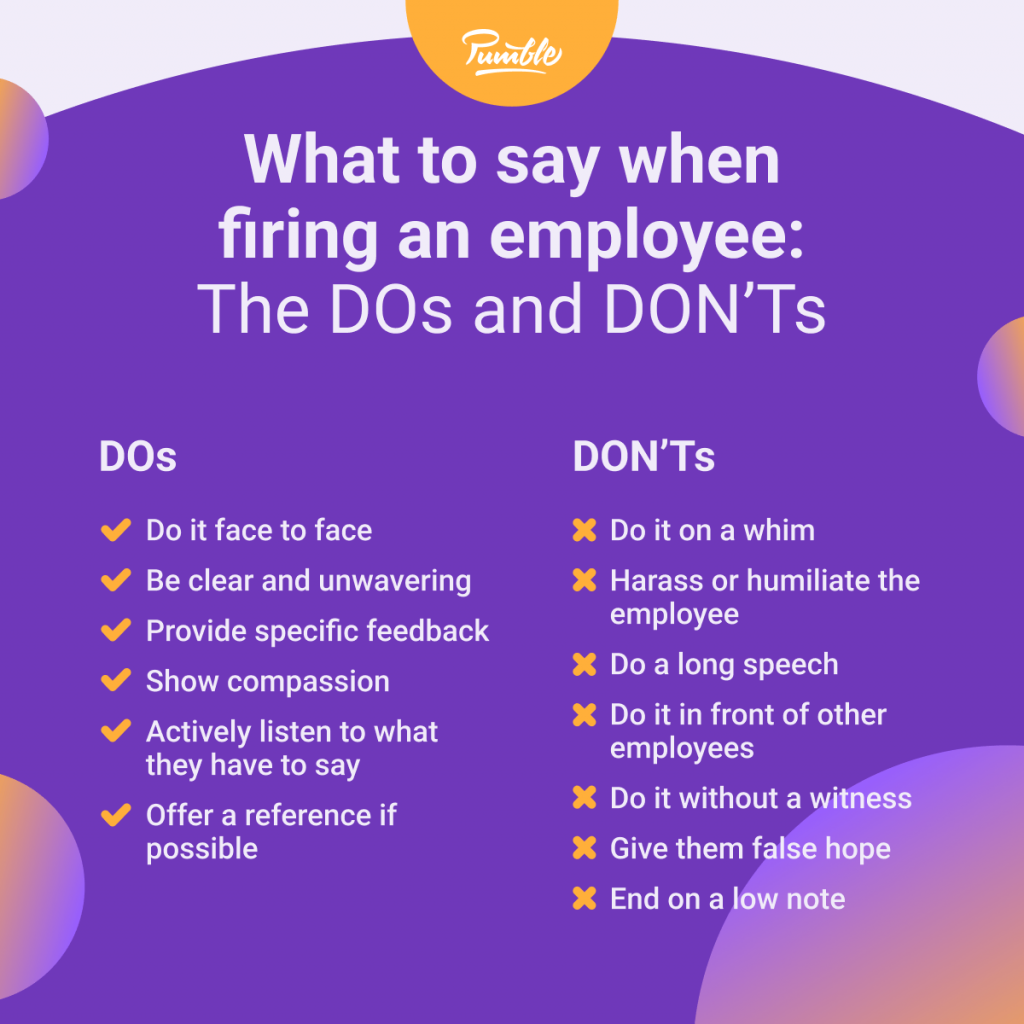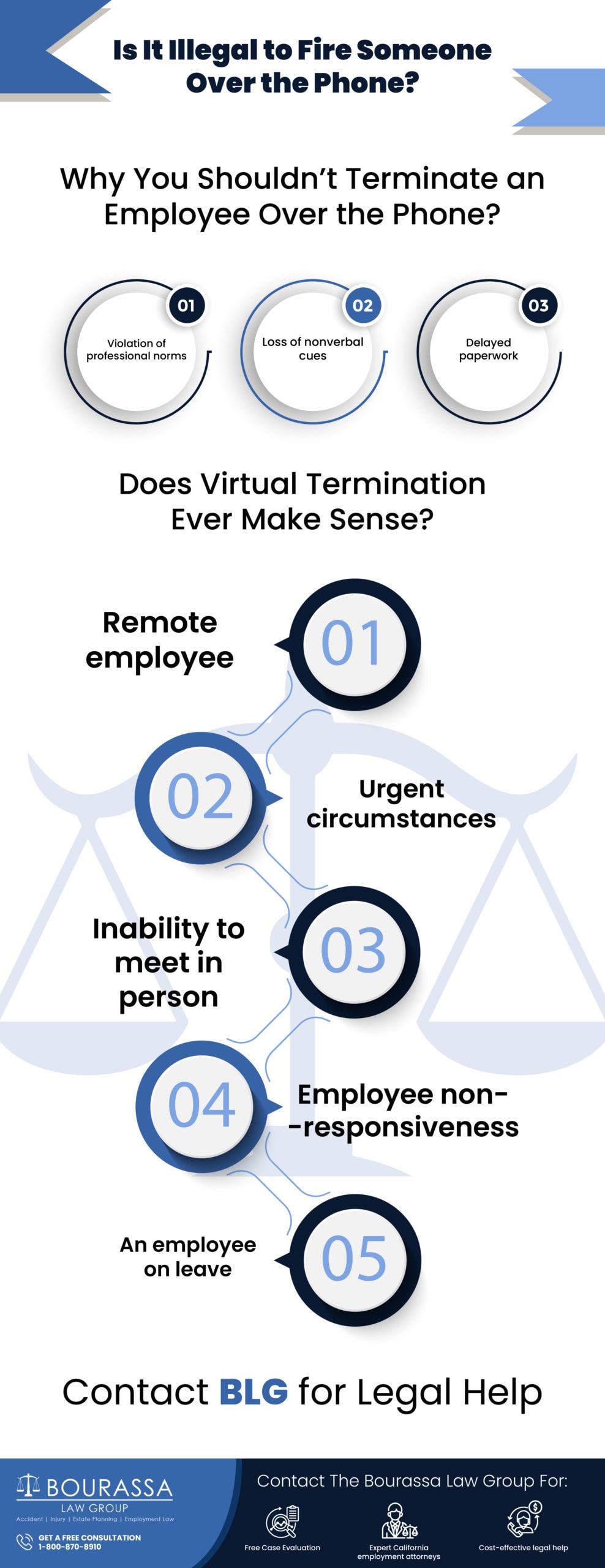Can You Fire Someone Over The Phone

Imagine Sarah, a dedicated marketing manager, settling into her home office, coffee steaming beside her. Her phone rings, displaying her boss’s name. What starts as a seemingly routine check-in soon spirals into a conversation ending with the words no employee wants to hear: "We're letting you go." The shock reverberates through her, leaving her stunned and questioning – can they even do that?
The question of whether an employer can fire someone over the phone is more complex than it appears at first glance. While legally permissible in many places, the ethical and practical implications can significantly impact both the employee and the employer's reputation. Let’s delve into the legal landscape, the best practices, and the human element of this sensitive issue.
The Legal Landscape
In the United States, the concept of "at-will" employment reigns supreme in most states. This means an employer can terminate an employee for any reason, or no reason at all, as long as it’s not discriminatory or retaliatory. Consequently, a phone call termination is generally legal in at-will states.
However, there are exceptions. Contractual agreements, union agreements, or company policies may stipulate specific termination procedures. These might require written notice, in-person meetings, or a certain period of warning before a firing can occur.
Furthermore, federal and state laws protect employees from discriminatory firings based on protected characteristics like race, religion, gender, age, or disability. If a phone call termination is motivated by discrimination, it’s illegal, regardless of the medium used for the firing.
The Ethical Considerations
Even if legal, firing someone over the phone often raises ethical questions. Experts in human resources management generally frown upon phone terminations as impersonal and lacking in empathy.
According to the Society for Human Resource Management (SHRM), while not explicitly barring phone terminations, encourages face-to-face meetings for sensitive conversations like terminations to foster respect and allow for a more nuanced dialogue. SHRM emphasizes the importance of treating employees with dignity, even during termination.
A phone call can feel dismissive and rob the employee of the opportunity to ask questions, gather clarification on severance packages, or share their perspective.
Best Practices for Employers
While a phone call firing might be legally sound in some circumstances, responsible employers strive to handle terminations with care and consideration. Transparency and respect are paramount. A clear, well-documented process should be in place.
Consider the circumstances. If an employee works remotely or a meeting is impossible due to logistical constraints (e.g., the employee living in another country), a phone call might be unavoidable. In these cases, providing a detailed written explanation following the phone call is crucial.
Whenever feasible, an in-person meeting is the preferred approach. It allows for direct communication, facilitates a smoother Q&A session, and demonstrates respect for the employee's contributions.
Protecting the Company
Employers also need to protect themselves legally. Documenting the reasons for termination meticulously is crucial. Consulting with legal counsel before any termination, especially one conducted over the phone, is highly recommended.
Be prepared to answer questions about severance, benefits, and outplacement services. Have all the necessary paperwork ready to send immediately following the phone call to minimize confusion and potential legal challenges.
Furthermore, consider having a witness present during the call, especially if there is a risk of the employee becoming upset or confrontational. This witness can corroborate the details of the conversation if needed later.
The Employee's Perspective
Being fired is devastating, regardless of the delivery method. A phone call can amplify the feelings of shock, anger, and disrespect. "It's like being dumped by text," one former employee lamented on an online forum dedicated to workplace issues.
If you find yourself terminated over the phone, stay calm. Try to gather as much information as possible about the reasons for termination, severance details, and next steps. Don't be afraid to ask for a written confirmation of your termination.
Consult with an employment lawyer to understand your rights and options, especially if you suspect discrimination or believe the termination was handled improperly.
Conclusion
While legally permissible in many cases, firing someone over the phone is generally ill-advised. It can damage employee morale, hurt the employer's reputation, and potentially lead to legal complications. By prioritizing empathy, transparency, and following best practices, employers can navigate these difficult conversations with greater respect and integrity. Ultimately, treating employees with dignity, even in termination, builds a stronger and more ethical workplace culture.
"Always treat your employees exactly as you want them to treat your best customers." - Stephen Covey


















